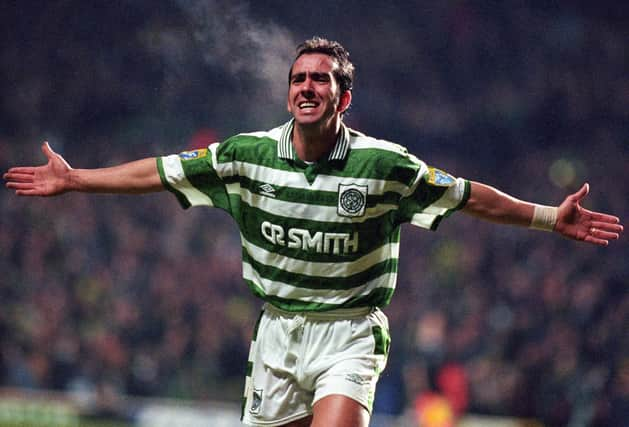Celtic v Lazio: Recalling the controversial icon that left an indelible mark on both clubs


Flamboyant former footballer Paolo Di Canio began his playing career with the Serie A outfit in his home city of Rome and later returned for a second spell after making a name for himself in Britain. His spells at Lazio and Celtic proved similar in that he was revered by supporters for his performances on the pitch, but embroiled in controversy and fallouts with senior club figures behind the scenes – a scenario repeated across most of the clubs he represented over 23 eventful years as a player.
Di Canio made his Lazio debut in October 1988 and went on to play 54 times for the club, scoring four goals, including the winner in his first Rome derby to become an instant hero with fans, before being sold to another of Italy's biggest clubs, Juventus, where he won the UEFA Cup in 1993.
Advertisement
Hide AdAdvertisement
Hide AdSpells at Napoli and Milan followed but, after a fall-out with Fabio Capello over his playing time at the San Siro, Di Canio upped sticks and moved to Scotland, signing for Celtic for £1m in the summer of 1996.
Di Canio stayed just one season with the Parkhead side but made a big impression, scoring 15 goals in 37 appearances under the management of Tommy Burns, but is also remembered for controversial moments in the Hoops.
He was sent off during a 2-2 draw against Hearts in November 1996 and was heavily involved in an acrimonious Old Firm match against Rangers in March 1997 where he aggressively confronted Ian Ferguson and gestured towards the Rangers' bench before being dragged from the field by teammates. He was summoned to the referee’s room afterwards and shown a second yellow card.
He left the club at the end of the season after his demands for a large wage rise were rejected by then Celtic chairman Fergus McCann and general manager Jock Brown.
Speaking recently to the Up Front podcast about his fallout at Celtic, Di Canio said: "When I shake hands with anyone, that counts way more for me than a hundred thousand contracts. At the beginning of the season we were negotiations, asking about money or bonus, but in the end they didn't want to give me what I expected. I said okay, by the end of the season if I'm doing with goals and assists and become an important part of the team, they say 'okay but we can't put this clause on the contract'.
"At the end of the season, if everybody voted you player of the year - were they mad? Or maybe I paid them or cost too much [he joked]. But straight away they said no we don't negotiate because from our point of view you did not have a good season.
"So I say ciao ciao from the office but you don't have my respect anymore because I went to pre-season in Ireland, but I was speaking to the media saying I'm not happy here because he didn't respect my work. I said to the Chairman through my agent if you want to sell me, sell me because I don't know if I can play, give my best, with no good feeling there."
Di Canio was sold to Sheffield Wednesday in a £4m deal where he became a fan favourite until his infamous push on referee Paul Alcock after being sent off against Arsenal at Hillsborough, which resulted in an extended ban of 11 matches and a £10,000 fine.
Advertisement
Hide AdAdvertisement
Hide AdIt proved to be his last game for the Owls before a £1.5m transfer to West Ham where he spent four years, becoming a club icon, and scoring a flying volley against Wimbledon considered to be one of the greatest goals in Premier League history.
A brief spell at Charlton Athletic followed before he returned to Italy to rejoin Lazio, where he was revered by the team's right-wing ultras but issues with teammates, coaches, and club president Claudio Lotito saw him released in the summer of 2006.
He subsequently signed with Cisco Roma of Serie C2 on a free transfer before announcing his retirement from football in March 2008 at the age of 39, but fans of Celtic and Lazio will always remember the indelible mark the now 55-year-old left on both clubs.
Comments
Want to join the conversation? Please or to comment on this article.
